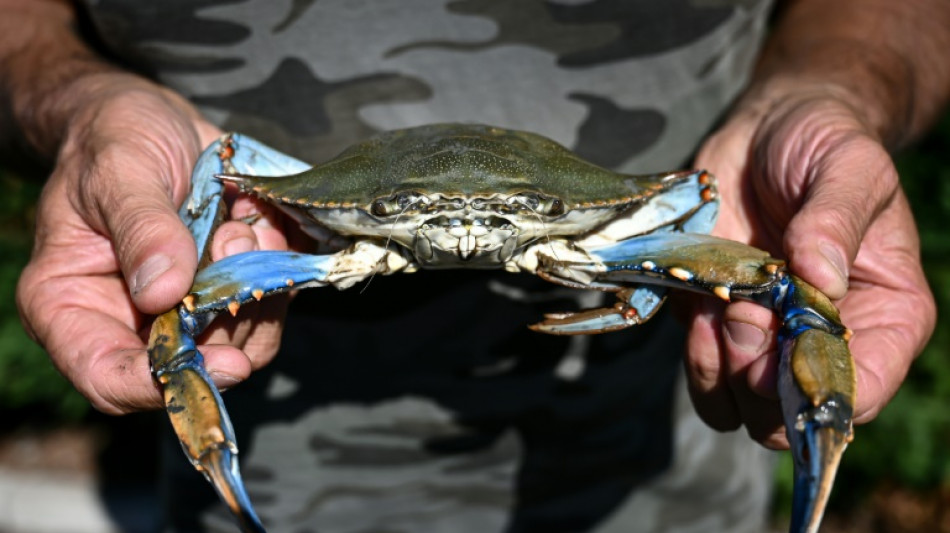
-
 Indian army says new exchange of gunfire with Pakistan
Indian army says new exchange of gunfire with Pakistan
-
Epstein accuser Virginia Giuffre takes own life in Australia: family

-
 Hundreds of buildings damaged, dozens injured in 6.3 Ecuador quake
Hundreds of buildings damaged, dozens injured in 6.3 Ecuador quake
-
India and Pakistan's Kashmir fallout hits economy too

-
 Francis's funeral to be grand farewell to 'pope of the poor'
Francis's funeral to be grand farewell to 'pope of the poor'
-
Pogacar faces defiant Evenepoel at Liege-Bastogne-Liege

-
 Chelsea eye great escape against Barcelona in Women's Champions League
Chelsea eye great escape against Barcelona in Women's Champions League
-
Iran, US to hold new round of high-level nuclear talks

-
 'Energy and effort' pay off for Reds as Blues' woes continue
'Energy and effort' pay off for Reds as Blues' woes continue
-
Albatross and closing birdie lift China's Liu to LPGA Chevron lead

-
 On the horizon? Wave of momentum for high seas treaty
On the horizon? Wave of momentum for high seas treaty
-
Developing countries should fast-track US trade deals: World Bank president

-
 Grizzlies' Morant 'doubtful' for must-win game 4 v Thunder
Grizzlies' Morant 'doubtful' for must-win game 4 v Thunder
-
Trump in Rome for pope funeral in first foreign trip of new term

-
 Trump says Russia-Ukraine deal 'very close' after new Kremlin talks
Trump says Russia-Ukraine deal 'very close' after new Kremlin talks
-
US rookies lead PGA pairs event with McIlroy and Lowry in hunt

-
 Trump tariff promises get a reality check
Trump tariff promises get a reality check
-
Warriors coach Kerr 'relatively optimistic' injured Butler will play game 3

-
 Postecoglou hopes 'Stonecutter's Credo' can inspire Spurs
Postecoglou hopes 'Stonecutter's Credo' can inspire Spurs
-
PSG lose unbeaten Ligue 1 record ahead of Arsenal showdown

-
 Venezuela accuses El Salvador president of 'human trafficking'
Venezuela accuses El Salvador president of 'human trafficking'
-
Own goal takes Sundowns to African final against Pyramids

-
 Scores of buildings damaged, 20 injured in Ecuador quake
Scores of buildings damaged, 20 injured in Ecuador quake
-
US stocks extend rally as market eyes busy calendar next week

-
 Pope's death triggers surge of disinformation he fought against
Pope's death triggers surge of disinformation he fought against
-
Rovanpera takes control of Rally Islas Canarias

-
 Zelensky insists Crimea is Ukrainian as US envoy meets Putin
Zelensky insists Crimea is Ukrainian as US envoy meets Putin
-
Patel and Mendis help Sunrisers beat Kings in Dhoni's 400th T20

-
 Copa del Rey ref statements 'unacceptable': Real Madrid after boycotting final build-up
Copa del Rey ref statements 'unacceptable': Real Madrid after boycotting final build-up
-
Insurance CEO's accused killer pleads not guilty to federal murder charges

-
 FBI arrests Wisconsin judge for shielding undocumented migrant
FBI arrests Wisconsin judge for shielding undocumented migrant
-
Brazil ex-president Collor de Mello jailed for corruption

-
 Zelensky insists Crimea 'belongs' to Ukraine as US envoy meets Putin
Zelensky insists Crimea 'belongs' to Ukraine as US envoy meets Putin
-
Real Madrid boycott Copa del Rey build-up over referee complaints

-
 Trinidad and Tobago votes for parliament, PM, with opposition in lead
Trinidad and Tobago votes for parliament, PM, with opposition in lead
-
IMF chief hails 'constructive' Spring Meetings held under tariff uncertainty

-
 Iran FM Araghchi in Oman ahead of nuclear talks with US
Iran FM Araghchi in Oman ahead of nuclear talks with US
-
Dozens of buildings destroyed, 20 injured in Ecuador quake

-
 Young Barca must 'enjoy' Real Madrid Copa final fight: Flick
Young Barca must 'enjoy' Real Madrid Copa final fight: Flick
-
Pakistan and India border closure separates families

-
 Brazil's Bolsonaro 'stable' after post-surgery setback
Brazil's Bolsonaro 'stable' after post-surgery setback
-
Catholics in secular Cuba hail Francis as 'bridge'

-
 US envoy Witkoff, Putin discuss 'possibility' of direct Russia-Ukraine talks
US envoy Witkoff, Putin discuss 'possibility' of direct Russia-Ukraine talks
-
Community seeks answers after French school knife killing

-
 German prosecutors seek jail terms in VW 'dieselgate' trial
German prosecutors seek jail terms in VW 'dieselgate' trial
-
Sabalenka makes winning start at Madrid Open

-
 EU, US should de-escalate and negotiate trade deal: IMF Europe director
EU, US should de-escalate and negotiate trade deal: IMF Europe director
-
Russia accuses Ukraine of killing general in car bombing

-
 Emery wants FA Cup glory and Champions League berth for Villa
Emery wants FA Cup glory and Champions League berth for Villa
-
Buildings destroyed, one injured in Ecuador quake


Invasive species a growing and costly threat, key report to find
Invasive species that destroy forests, ravage crops and cause extinctions are a major and growing threat worldwide, a landmark UN-backed assessment is poised to report.
From water hyacinth choking Lake Victoria in East Africa, to rats and brown snakes wiping out bird species in the Pacific, to mosquitoes exposing new regions to Zika, yellow fever, dengue and other diseases, tens of thousand of aliens species have taken root -- often literally -- far from their place of origin.
The science advisory panel for the UN Convention on Biodiversity, known by its acronym IPBES, will release on Monday the most comprehensive assessment of so-called "alien species" ever assembled.
Humans are to blame when non-native species wind up on the other side of the world, whether by accident or on purpose.
Scientists point to the pervasive spread of these species as hard evidence that rapid expansion of human activity has so radically altered natural systems as to tip Earth into a new geological epoch called the Anthropocene, or the "era of humans".
Some invasive species are accidental arrivals, hitching rides in the ballast water of cargo ships, the containers in their holds, or in a tourist's suitcase.
Others were introduced deliberately.
The hyacinth which at one point covered 90 percent of Lake Victoria -- crippling transport and fishing, smothering aquatic life, blocking hydroelectric dam intake, and breeding mosquitoes -- is thought to have been introduced by Belgian colonial officials in Rwanda as an ornamental garden flower before making its way down the Kagera River in the 1980s.
The Everglades wetlands preserve in Florida is teeming with the destructive offspring of erstwhile pets and house plants, from five-metre (16-foot) Burmese pythons and walking catfish to Old World climbing fern and Brazilian pepper.
Invasive species are a significant cause of extinctions, along with habitat loss, global warming, pollution and direct exploitation for food or body parts.
Small islands with endemic species not found anywhere else on Earth are especially vulnerable.
Rats, snakes and mosquitoes transported by Western explorers or, later, tourists have wiped out dozens of bird species in the last two centuries.
The deadly fire that reduced the Hawaiian town of Lahaina to ashes last month was fuelled in part by bone-dry guinea, molasses and buffel grasses -- imported as livestock feed -- that have spread across abandoned sugar plantations.
A global treaty to protect biodiversity hammered out in the Canadian city of Montreal last December sets a target of reducing the rate at which invasive alien species spread by 50 percent compared to current levels.
J.Oliveira--AMWN



